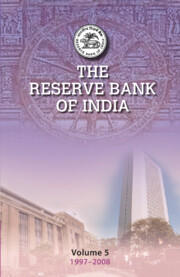Book contents
- Frontmatter
- Contents
- Tables
- Boxes
- Foreword
- Preface
- Acknowledgements
- List of Abbreviations
- 1 Introduction: Managing Liberalisation
- 2 The Macroeconomic Context
- 3 Monetary Management
- 4 Foreign Exchange Market and Management of the Capital Account
- 5 Foreign Exchange Reserves Management
- 6 Financial Markets
- 7 Public Debt Management
- 8 The Payment and Settlement Systems
- 9 Currency Management
- 10 Regulation of the Financial System – Part I: Commercial Banks
- 10 Regulation of the Financial System Part II: Other Financial Institutions
- 11 Supervision of the Financial System
- 12 Rural Credit
- 13 Financial Inclusion
- 14 Communication Policy
- 15 Organisational Change
- Appendices
- Photographs
- Select Bibliography
- Index
13 - Financial Inclusion
Published online by Cambridge University Press: 10 January 2023
- Frontmatter
- Contents
- Tables
- Boxes
- Foreword
- Preface
- Acknowledgements
- List of Abbreviations
- 1 Introduction: Managing Liberalisation
- 2 The Macroeconomic Context
- 3 Monetary Management
- 4 Foreign Exchange Market and Management of the Capital Account
- 5 Foreign Exchange Reserves Management
- 6 Financial Markets
- 7 Public Debt Management
- 8 The Payment and Settlement Systems
- 9 Currency Management
- 10 Regulation of the Financial System – Part I: Commercial Banks
- 10 Regulation of the Financial System Part II: Other Financial Institutions
- 11 Supervision of the Financial System
- 12 Rural Credit
- 13 Financial Inclusion
- 14 Communication Policy
- 15 Organisational Change
- Appendices
- Photographs
- Select Bibliography
- Index
Summary
Introduction
The Banking Regulation Act, 1949, or the BR Act, vested sweeping powers with the Reserve Bank to regulate banking companies, essentially to protect the ‘interests of depositors’. Customer service, however, was a neglected field in banking, especially after the nationalisation of banks, as the number of bank branches and clients increased manifold.
The Reserve Bank recognised the problem early, but service quality continued to be a matter of concern. It was common in the 1970s for a customer to wait for twenty to thirty minutes to withdraw cash from the account or to make repeated visits to the branch to have the passbook updated. It took two days to get a cheque book, six hours to get a demand draft and at least one week to get a local cheque and four to six weeks to get an outstation cheque cleared. The Bank constituted a committee in 1990 to look into the causes of the persistence of poor customer service in banks. The recommendations of the committee included an extension of business hours for non-cash transactions, uninterrupted service at the counters, introduction of ‘may I help you’ desks, and a customer complaint book, among other measures.
The onset of the financial sector reforms in the 1990s gave greater operational freedom to banks. This, together with the introduction of technology, led to general improvement in services. New channels of delivery of service meant that the time taken for delivery of service was reduced. Increased competition, with the entry of new private banks in 1994–95, reinforced the tendency. But the entry of new players did not serve consumer interest significantly better than before. In the rural areas, often a single bank served a large number of people so that the benefits of competition remained limited. Further, the legal processes for establishing customer rights and entitlements were unaffordable in time and money.
As competition depressed interest income, there was pressure on banks to increase their non-interest income, and new charges were levied on the customer, such as the penalty for not maintaining a minimum balance in deposit accounts, using the service at a non-home branch, and premature loan repayment. The entry of ‘new generation’ banks (fully computerised from the start) and the adoption of new technology by all banks led to new problems.
- Type
- Chapter
- Information
- The Reserve Bank of IndiaVolume 5, 1997–2008, pp. 559 - 595Publisher: Cambridge University PressPrint publication year: 2023



